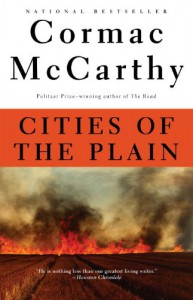Cities of the Plain: Border Trilogy (3)
 I'm awful torn about this book. It's so, so different for McCarthy. Cities of the Plain is a dialogue driven conclusion to the Border Trilogy. It reads almost like a movie script at times - gone is the desert, the environment, as character and partner in the dialogue and in its place is a panoply of characters that run the gamut from forgettable to shortly, but violently intense. I think it took Cities to really reveal to me the true nature of the previous two entries in the series. The setting lends to introspection - it's adversary, philosopher, God and judge all in one. The first two books are deeply meditative, reaching apogee in The Crossing and dwindling to superficiality and even levity at times in Cities - until the second half. I have to admit, I wasn't really feeling this book for the first part. The quiet ranch life of Billy and John Grady, both matured and scarred from their experiences crossing the border in their youth, seemed rather wayward and dull to me. This period is presented as an idyllic contrast to the violent coming of age that both youths experienced and to the mayhem that is to follow, a respite from the intensity of the usual McCarthy bloodletting. It's not that I craved or missed that violence. My favorite parts of both the preceding novels were the quiet acts of hospitality, the companionship of the campfires and the solitary wanderings and musings of the protagonists. At times, it just felt like neither man was the same character. Of course, they've grown and time has passed, but there seemed an enormous disconnect, especially with Billy. That being said, McCarthy does tie up the story rather convincingly and there are several elements to this story that recalled the greatest aspects of both The Crossing and All the Pretty Horses. Billy finds a new Boyd in John Grady - romantic, wild and obstinant, and both men find in each other what they failed to find and bring back from their crossings into Mexico.
I'm awful torn about this book. It's so, so different for McCarthy. Cities of the Plain is a dialogue driven conclusion to the Border Trilogy. It reads almost like a movie script at times - gone is the desert, the environment, as character and partner in the dialogue and in its place is a panoply of characters that run the gamut from forgettable to shortly, but violently intense. I think it took Cities to really reveal to me the true nature of the previous two entries in the series. The setting lends to introspection - it's adversary, philosopher, God and judge all in one. The first two books are deeply meditative, reaching apogee in The Crossing and dwindling to superficiality and even levity at times in Cities - until the second half. I have to admit, I wasn't really feeling this book for the first part. The quiet ranch life of Billy and John Grady, both matured and scarred from their experiences crossing the border in their youth, seemed rather wayward and dull to me. This period is presented as an idyllic contrast to the violent coming of age that both youths experienced and to the mayhem that is to follow, a respite from the intensity of the usual McCarthy bloodletting. It's not that I craved or missed that violence. My favorite parts of both the preceding novels were the quiet acts of hospitality, the companionship of the campfires and the solitary wanderings and musings of the protagonists. At times, it just felt like neither man was the same character. Of course, they've grown and time has passed, but there seemed an enormous disconnect, especially with Billy. That being said, McCarthy does tie up the story rather convincingly and there are several elements to this story that recalled the greatest aspects of both The Crossing and All the Pretty Horses. Billy finds a new Boyd in John Grady - romantic, wild and obstinant, and both men find in each other what they failed to find and bring back from their crossings into Mexico. The best of this particular novel lies in the inexorability of its conclusion. There's a long build-up for a rather intense burst of inevitable finality that is wonderfully commented upon by both narrator and the usual wandering sage that enters and exits after stopping in just long enough to give Billy or John Grady an existential earful. There's a strong sense of predestination about the book, and maybe he overplays his hand on the commentary of it at times, which takes some of the subtlety out of it - but when McCarthy drops wisdom you can't help but be awed by it, even when he waxes repeatedly. Anyway, there's an ending, competently and artistically told that closes a loop making the whole story feel glued together and connected in ways that reminded me faintly of Lost. Not in the weird time-travelly sort of way, but in its absolute invariance of and celebration of fate and the role we play in a very complicated and entangled interdependent web.
To be honest, McCarthy makes me feel as dumb as a rock sometimes. There's always the sense that for every truth gleaned, there are about 90 I missed. Definitely worth a re-read.



